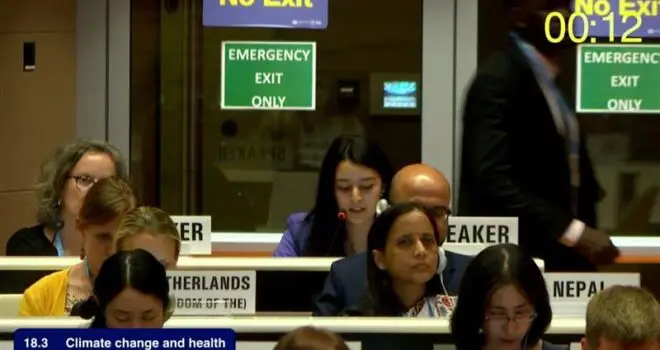The Novartis Foundation (NF) is committed to leveraging the power of data to improve population health and the World Heart Federation (WHF) has a vision of heart health for all. With the support of The Novartis Foundation as one of the first contributing partners, the World Heart Observatory is a one-of-a-kind global resource launched by WHF. This article is based on an interview with Dr Ann Aerts, Head of The Novartis Foundation, highlighting some key paths to a heart-healthy future.
It’s a staggering figure: cardiovascular disease (CVD) claims more than 18 million lives each year. A combination of factors threatens to increase this statistic: regular check-ups postponed during the pandemic and the particular danger COVID-19 poses to those with heart risks such as hypertension, diabetes, and obesity. The jump in virtual health consultations during the pandemic, from the thousands to the millions, provides us with an opportunity to be maximised. Whether it is a smartphone that can read blood pressure numbers or a wearable heart monitor, data has the power to improve lives. Data and technology are also of particular benefit in low-income settings where four out of five CVD-related deaths occur.
As Dr Ann Aerts, Head of the Novartis Foundation recently said, “we have loads of data about cardiovascular health, but it is often so disconnected that using it for something meaningful becomes a real challenge. We must be able to harness the data into something instructive that can help us understand the drivers of heart health and show patterns or emerging solutions.” The World Heart Observatory lays the groundwork for this harnessing of data. With wider access to connected data, artificial intelligence (AI) and analytics can draw meaning from data across clinics, care centers and health registries worldwide, and inform health practice. Understanding gaps, trends, and successes will give us a better picture of the underlying drivers of health to truly impact people’s lives and create healthier societies.
Proactive, predictive, and preventive
Data, digital technology and artificial intelligence are tools that are increasingly embraced in health and care. From a simple phone call in which AI-driven responses guide the caller through recommended steps and direct them to consultations with medical specialists, to elaborate body scans and imaging tests, access to quality data and applied artificial intelligence already makes a tremendous difference in healthcare.
Open to all, the World Health Observatory will serve as a hub for high-quality data on cardiovascular health, collated from diverse international data sources. It will capture existing initiatives addressing CVD, offer CVD data reports, and share knowledge and research. This “unsiloed” approach to data collection, combining and analysis fills a niche in a new way. “Reasoning over combined datasets is key if we are to help health systems transform from being reactive care systems to become proactive, predictive, and preventive health systems, and the World Health Observatory is a tool for putting this approach into practice,” says Dr Aerts.
The World Heart Observatory aims to become a one-stop hub for global data on CVD, its biological risk factors, social determinants, and corresponding health system responses. Take, for example, the Novartis Foundation’s approach toward urban population health, CARDIO4Cities, which began by addressing high blood pressure as the prime risk factor for CVD and now extends toward lowering overall CV risk in city populations. Working with local authorities and multiple sectors, CARDIO4Cities helped improve blood pressure control with remarkable results, both within and outside the “brick and mortar” of the health systems. Another body of work, the Global Data Collaborative for CV population health, aspires to use AI and advanced analytics to mine and analyse data from diverse sources to better understand CVD and help policy makers and health system managers address the disease more efficiently in large populations. Results and findings from these initiatives and partnerships, rather than remaining at country level, can be shared through the open-access World Heart Observatory.
Transformation is at our fingertips
Partnerships are crucial. We do not know everything there is to know about heart disease so sharing every bit of knowledge, while maintaining respect for patient privacy and adhering to protocols, is “a must.” This way, we can expand access to best practices wherever they are happening across the globe. We can strengthen policy instruments, get insights from others and adjust mechanisms.
Data, digital technology and AI are a critical part of the solution to better heart health; the people and platforms that interpret the solutions and make them accessible are indispensable. A self-described “optimist,” Dr Aerts says that “transformation is at our fingertips.” With the new World Heart Observatory, we have reason to share her hope.
Ann Aerts, M.D. is Head of the Novartis Foundation, an organisation committed to transforming the health of low-income populations. Passionate about improving health through data, digital technology and AI, Dr Aerts is committed to pioneering solutions that will help overcome health inequities and advance health and care globally. She chairs the Broadband Commission for Sustainable Development Working Group on Digital and AI in Health and is a member of the Board of the Philips Foundation. She holds a Degree in Medicine, a Master’s in public health from the University of Leuven, Belgium, and a Degree in Tropical Medicine from the Institute of Tropical Medicine in Antwerp, Belgium.


